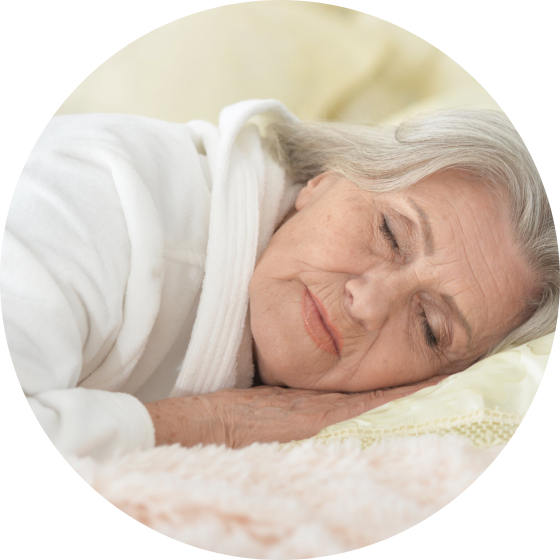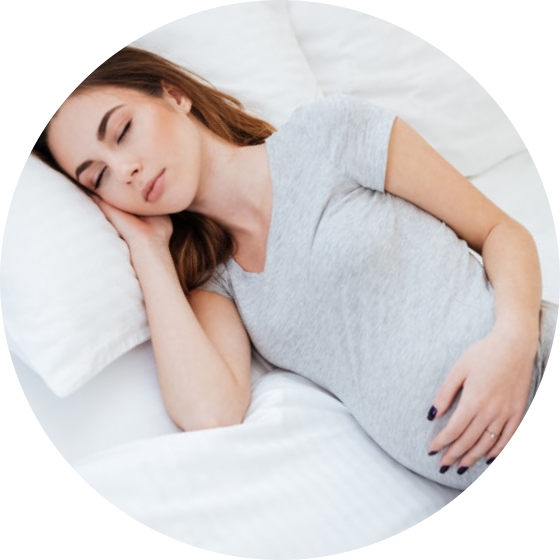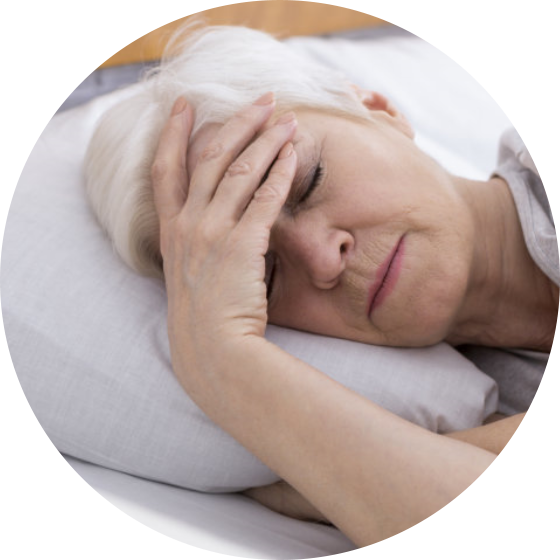Insomnia
Last updated: October 2023
Home > Information & Support > Adults > Sleep Disorders >What is Insomnia?
Insomnia is a sleep disorder where you have extreme difficulty in getting to sleep, staying asleep or waking too early and not being able to fall back asleep. It’s a common problem thought to affect around one in every three people in the UK in its acute form, with around 10-15 in every 100 people suffering from chronic sleep difficulties.
It’s important to learn to spot the signs and get the right treatment if you need it.
Types of insomnia
Acute insomnia is a short period of poor sleep – anywhere between two to twelve weeks – and in most cases is perfectly normal. It is often caused by stressful life events like a major illness, bereavement etc. Most of us will experience this, and it is often rectified when a particular situation or worry has been alleviated. Stimulus control (see below under Treatments) may be effective.

Chronic insomnia is when you have been experiencing poor sleep for longer than twelve weeks and generally is diagnosed when it’s been occurring for at least three nights per week. It prevents you from achieving the sleep you need to function at your best.
Types of insomnia symptoms
There are three main symptom types of insomnia:
Sleep onset insomnia: difficulty in falling asleep, regularly taking a long time to fall asleep
Sleep maintenance insomnia: repeatedly waking in the night, struggling to fall back asleep
Early morning waking: waking earlier than you’d like, or need to, in the morning, unable to fall back to sleep
Causes of insomnia
Anxiety, stress, and depression are some of the most common causes of chronic insomnia – and having difficulty sleeping can also make these symptoms worse. There are also many medical conditions that can lead to insomnia too such as allergies, gastrointestinal problems, arthritis, asthma, neurological conditions and chronic pain. Other common emotional and psychological causes include anger, worry, grief and trauma. It’s worth noting that insomnia can co-exist with a number of other illnesses and conditions or even make them worse.
Family history, age and gender may also play a part. For instance, women are more prone to insomnia due to hormonal changes during the menstrual cycle, pregnancy and menopause.
Insomnia can also be triggered from shift work, travel, poor sleep hygiene and an inappropriate bedroom environment. This can get better by practising better lifestyle and sleep habits.

Insomnia and Age

Insomnia and Pregnancy

Insomnia and Menopause
Signs of insomnia
Insomnia is a medical disorder and needs to be diagnosed via a specific checklist, to rule out any other illnesses. You generally have to answer ‘yes’ to all the six points.
The checklist includes:
1. You have difficulty in getting off to sleep, staying asleep or waking earlier than required in the morning and can’t go back to sleep
2. The sleep difficulty exists despite the adequate opportunity to sleep
3. It presents for at least three nights per week
4. It presents for at least three months
5. You experience distress and/or disruption to daily functioning
6. The sleep difficulty can not be solely explained by another illness, disease, substance or other sleep disorder
Insomnia isn’t just ‘not sleeping well’. It has a huge effect on energy levels, mood, productivity and cognitive skills such as impaired memory or attention.
Insomnia can also be triggered from shift work, travel, poor sleep hygiene and an inappropriate bedroom environment. This can get better by practising better lifestyle and sleep habits.
When to see your GP
If you’ve had difficulty with your sleep for more than four weeks and it’s having an impact on your wellbeing, it’s important to make an appointment to see your GP before it becomes chronic. They may use a variety of methods to determine the cause of your insomnia and to rule out other potential sleep disorders. It can be useful to take a completed two-week sleep diary to show your GP. A sleep diary is designed to gather information about your daily sleep patterns.
It can be useful to complete The Sleep Charity Sleep Diary before your GP visit.
Treatments for insomnia
It’s important to get help with insomnia as soon as possible.
For people with acute insomnia, the focus may be on managing your worries and concerns about a lack of sleep. A temporary prescription for sleep medication may be an option if insomnia is causing high levels of distress. A new drug has recently been approved in the UK for long term use in chronic insomnia. It works by temporarily blocking a transmitter in the brain that causes wakefulness, therefore helping us to fall asleep and stay asleep.
However, Cognitive Behavioural Therapy for Insomnia (CBT-I) is recommended as the first line treatment for people with insomnia. It can help control or eliminate negative thoughts and actions that keep you awake.
What is Cognitive Behavioural Therapy for Insomnia or CBT-I?
CBT-I has been around for more than 30 years and it a collection of evidence-based techniques that have been shown to be helpful if you’re suffering with insomnia.
There are two main parts to CBT-I – cognitive and behavioural.
Cognitive – this helps you to manage worries, concerns and anxieties that are related to your insomnia.
Behavioural – this looks at identifying and changing habits, rituals and behaviours that you have developed, mainly in response to suffering with acute insomnia.
Strategies for this include:
- Stimulus Control – ensuring that the bedroom is only used for sleeping and sex. You should avoid reading, watching TV, eating and studying in the bedroom. The bedroom should be associated with sleep and not wakefulness. As part of stimulus control, you will be instructed to get out of bed if you haven’t fallen asleep before you become anxious, frustrated or worried (whether that’s when you’re going to sleep or have woken in the night), only returning to the bedroom when you feel sleepy.
- Sleep Rescheduling – this limits the time spent in bed awake, and helps to increase the drive to sleep again. It can temporarily increase daytime sleepiness and is not recommended for people with certain medical conditions or people that do certain jobs. Once you’re spending the majority of your time in bed sleeping, your bedtime can be brought forward.
- Relaxation Techniques – these can help reduce the racing thoughts that often appear once you’re in bed. These techniques can be breathing exercises or progressive muscle relaxation (PMR).
- Sleep Hygiene – a set of guidelines that can improve sleep.
CBT-I must be provided by a trained practitioner or professional.
Prescription medications for insomnia
Prescription sleeping pills can help you get to sleep, stay asleep or both. Your GP will recommend you don’t rely on prescription sleeping pills for more than a few weeks as there can be side effects including habit forming. The UK recently approved a new drug for chronic insomnia, that can be used long term. It is important to remember that there are a few different types of prescription medications for sleep, which work quite differently, so it is worth having a discussion with your GP about the pros and cons of each.
Over the counter (OTC) sleep aids
You can buy sleeping aids from pharmacies that may help you sleep better. Some contain natural ingredients like lavender or valerian while others contain active substances, such as diphenhydramine. There is limited evidence that they cure insomnia but they may be useful in helping you sleep if you have had a couple of poor nights, though they are not intended for regular use. It’s important to speak to your GP before taking these.
This page was co-produced and reviewed by Professor Jason Ellis of Northumbria University.
